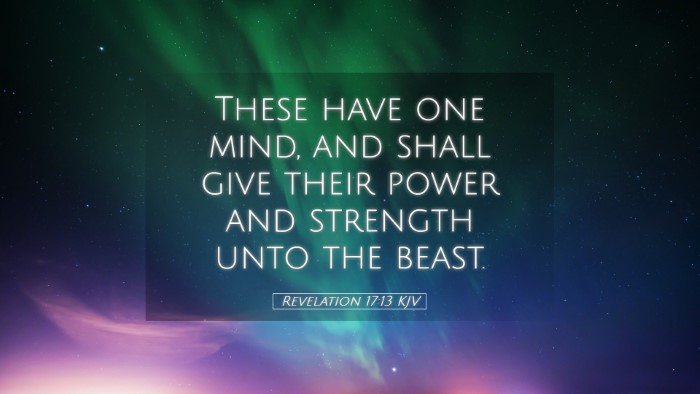Commentary on Revelation 17:13
Introduction: Revelation 17:13 is a pivotal verse in the book of Revelation, which highlights the unity among the kings and their purpose in relation to the beast. This passage serves as a critical point of analysis for understanding the nature of political and spiritual power in the apocalyptic context.
Main Themes:
- The Unity of the Kings:
This verse describes a coalition of kings who are united in purpose—“These have one mind.” This suggests a gathering of political power that resonates with the overarching themes of the book of Revelation concerning conflict between good and evil.
- Authority and Influence:
The kings “give their power and authority unto the beast.” This indicates a willingness to relinquish their sovereignty for a greater shared ambition, which underscores the seductive nature of power. The beast symbolizes a corrupt and oppressive regime that draws its strength from human alliances and ambitions.
Commentary Insights:
Matthew Henry's Commentary:
Matthew Henry emphasizes the significance of unity among these kings as a representation of collective rebellion against God’s authority. He notes that their alliance serves the beast, illustrating how fallen humanity often gathers to gratify sinful desires, leading to mutual destruction. The unity among the kings is seen not just as a political maneuver but as a spiritual deceit where autonomy is surrendered for the illusion of power.
Albert Barnes' Notes on the Bible:
Barnes provides a detailed examination of the phrase “have one mind.” He argues that this collective mindset reflects their common goals in opposition to Christ and His kingdom. The phrase implies not just agreement but a deep-rooted commitment to the cause of the beast—symbolizing all worldly powers that oppose spiritual truth. Barnes also interprets the “beast” as representative of systems of governance and authority that challenge the divine order.
Adam Clarke's Commentary:
Clarke offers insights into the theological implications of this coalition. He highlights the prophetic nature of such alliances throughout history, considering it a warning for all generations. Clarke asserts that such alliances often lead to judgment, emphasizing that while they momentarily appear strong, their ultimate fate is judgment and destruction as seen throughout the prophetic writings of the Bible.
Theological Reflections:
This verse invites pastors and theologians to reflect on the nature of human alliances and the potential dangers they pose when they are not aligned with God’s will. The verse serves as a stark reminder that power without accountability can lead to evil acts perpetrated in the name of authority, resonating with historical and contemporary examples of political and spiritual corruption.
Application for Believers:
As believers, understanding the implications of Revelation 17:13 should compel us to evaluate our own allegiances. Are we aligning ourselves with the values of this world, or are we committed to God's kingdom? The call for discernment is ever-present, reminding us that while the world may seem unified in opposition to God, true strength lies in faithful adherence to the truth of Scripture.
Conclusion:
Revelation 17:13 serves as a critical reminder of the allure of power and the potential for corruption when human beings unite against divine authority. Through insights gathered from respected commentaries, we are encouraged to remain vigilant against the seductive nature of worldly alliances and to uphold the teachings of Scripture as our ultimate guide.


